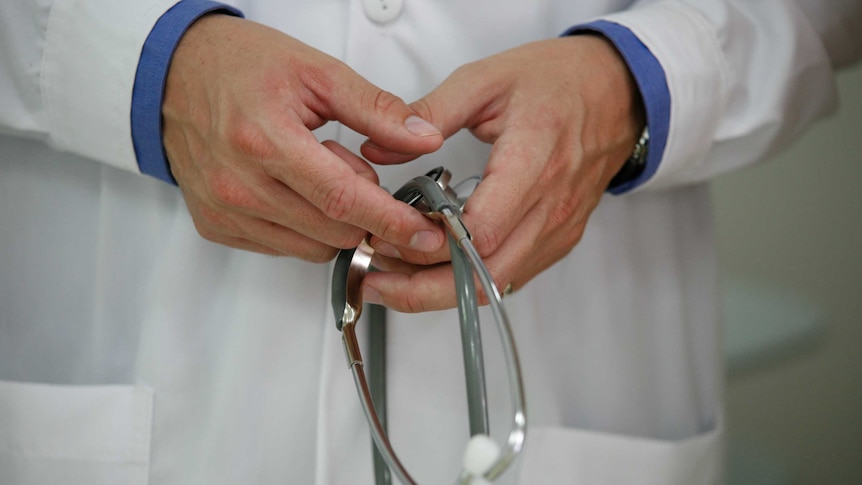Ratepayers in rural Tasmania are being slugged with a medical levy to help prop up GP clinics, prompting fresh calls for the commonwealth to step in.
Key points:
- Glamorgan-Spring Bay Mayor Robert Young said the levy was necessary to ensure the municipality’s vulnerable population had access to health care
- AMA Tasmania president John Saul said rural practice especially was struggling for funding
- He said an urgent review into Medicare funding was required, along with long-term planning
Councils including Glamorgan-Spring Bay, the Huon Valley and the Tasman have had to step in to keep local clinics open, and the Australian Medical Association (AMA) fears more will be forced down the same route unless Medicare funding is increased.
Glamorgan-Spring Bay Mayor Robert Young said the levy was necessary to ensure the municipality’s vulnerable population — where the median age is 56 — has access to health care.
Mr Young said about 60 per cent of the adults in his municipality were either retired or on some sort of government benefit.
“The levy is $90 payable every year by every ratepayer and it’s used to subsidize general practice and to encourage general practitioners to come to the east coast,” he said.
“It costs us between $550,000-$650,000 a year.”
He said not being able to attract doctors put pressure on emergency out-patients, and making a trip to Launceston or Hobart was too much for residents.
Moving closer to population centers was also not an option, he said, because they could not afford the higher rent and housing prices.
“There’s not a house or an apartment to rent that any reasonable person not earning a hell of a lot of money — and most of our people are retirees — to rent, so they couldn’t move back to Hobart.”
Dropping Medicare rebate makes it ‘impossible to bulk bill’
AMA Tasmania president John Saul said rural practice especially was struggling for funding, and it was being reflected in reduced levels of care.
“[Councils are] covering for the federal government inadequacies here, and they’re doing a great job, but it can’t keep going on forever,” Dr Saul said.
“We are sadly seeing the Medicare rebate drop so much that it’s impossible to universally bulk bill.
“We will see sections of communities that just won’t be able to afford to see a GP and it’s all the result of a government letting our patients down … [Medicare] has just become such a political football. No party seems to be really addressing the key problems.
“They just seem to be skirting around the edges and hiding from the key issues that are facing GPs and specialists alike who use Medicare.”
He said an urgent review into funding was required, along with long-term planning and “urgent strengthening of Medicare.”
“Our state government is doing their best to plug holes where they can, but we need some really systematic planning to work towards here.
“Years of neglect, we just need to get back on track and get some good planning in place.”
‘Not practical to travel to other clinics’
Tom Teniswood has been a resident at Triabunna for more than 40 years and said it was an unfair burden for local governments to be running GP clinics.
“We do want a medical service but I don’t think the local government are the right agency to be running a medical service,” he said.
“But then again, they are bound to look after the welfare of their contingency.”
He said it was not practical to travel across the state to other clinics.
“You’re an hour away minimum to a doctor in Sorell and their practices are full too.
“And with Sorell expanding the way it is, with new subdivisions going in, and things, they’ll be struggling to find more doctors.”
Federal govt must ‘come to the table’
In a statement, a spokesperson for the Tasmanian government said it “acknowledges the important role that GPs and the primary healthcare sector plays in caring for our community”, but added primary healthcare was “the responsibility of the federal government”
“We are working with the federal minister on what further supports from the federal government are required for the sector here in Tasmania,” it said.
“Recently, the government proposed a bold Primary Healthcare Reform vision to the federal government and we look forward to progressing this proposal through the development of a model to present to the Commonwealth for further discussion.”
The spokesperson said the Tasmanian government had “established a GP after-hours support initiative that provides funding through a grant process to support GPs and pharmacies to offer after-hours services to their local community and ease pressures on hospital emergency departments.
“While the Tasmanian government is doing all it can to assist general practice with innovative solutions, the federal government need to come to the table and provide additional supports and incentives to ensure the long-term sustainability of GP practices.”
The federal government has been approached for comment.
.
